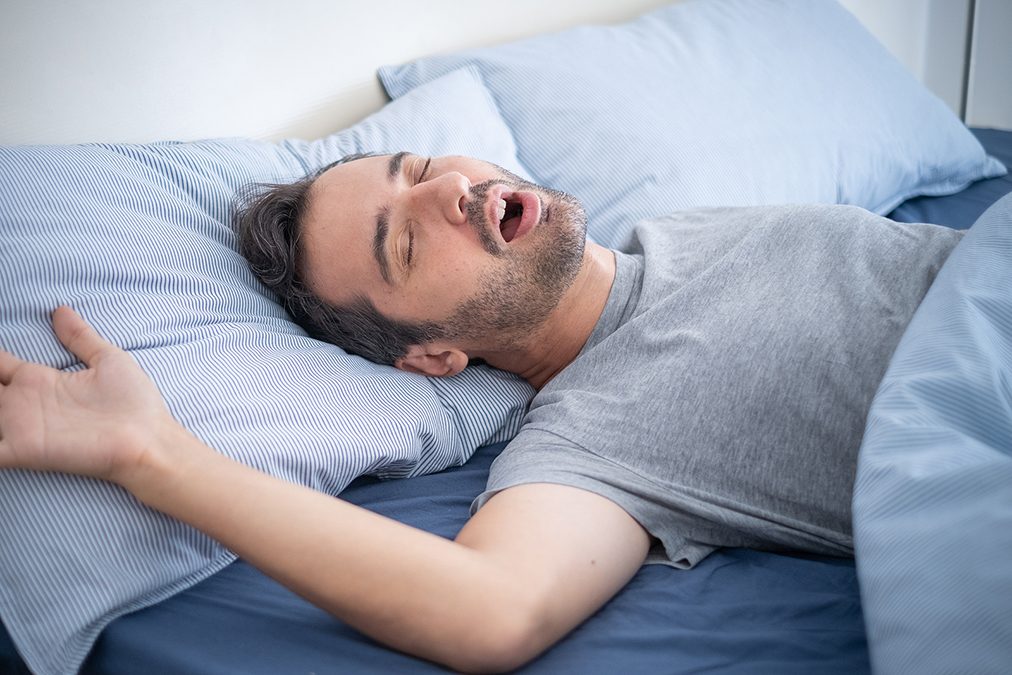 Snoring is usually considered an innocent annoyance. It’s sleep apnea, a disease closely related to snoring, that’s considered more dangerous.
Snoring is usually considered an innocent annoyance. It’s sleep apnea, a disease closely related to snoring, that’s considered more dangerous.
But a new study in the journal Sleep reveals how snoring can be life-threatening on its own.
Apparently, it causes an array of serious, fatal diseases.
Researchers from the University of Arizona used three years’ worth of data collected from the National Health and Nutrition Examination Survey in 2020.
Participants reported the frequency of their snoring over the past year.
Based on this information, the researchers divided them into groups of never, rarely (1–2 nights per week), occasionally (3–4 nights per week), and frequently (five or more nights per week).
Participants also reported their own number of sedentary minutes per day.
In addition to straightforward snoring, the participants also reported whether they experienced snorting or gasping during the night, something the researchers regarded as potential untreated sleep apnea.
They used snoring, snorting/gasping, daytime tiredness, high blood pressure, body mass index, age, and gender to calculate which of their subjects had the highest likelihood of suffering from sleep apnea.
Their findings were as follows.
-
1. Frequent snorers spent 19.2 more daily minutes being sedentary than those who reported no or little snoring.
2. People with suspected sleep apnea spent 16.2 more daily minutes being sedentary than those without suspected sleep apnea.
3. When the possible influences of sex, age, race, education level, and marital status were excluded, frequent snorers spent 35.9 more minutes inactive per day than their peers.
4. When these factors were excluded, those with suspected sleep apnea spent 43.9 more minutes being inactive per day than their peers.
This suggests that snorers and people at high risk of sleep apnea are less active during the day than their peers.
And we all know that being less active can cause a range of health issues, from cardiovascular diseases and type 2 diabetes to obesity and even sleep apnea itself.
So, this is yet another urgent reason to address snoring and sleep apnea.

 Overcoming IBD
Overcoming IBD Multiple Sclerosis
Multiple Sclerosis Banishing Bronchitis
Banishing Bronchitis Gum Disease Gone
Gum Disease Gone Overcoming Onychomycosis
Overcoming Onychomycosis Neuropathy No More
Neuropathy No More The Prostate Protocol
The Prostate Protocol Brain Booster
Brain Booster
 Ironbound
Ironbound
 Solution for Shingles
Solution for Shingles
 The Bone Density Solution
The Bone Density Solution
 The Ultimate Healing Protocol
The Ultimate Healing Protocol
 The Parkinson's Protocol
The Parkinson's Protocol
 The Chronic Kidney Disease Solution
The Chronic Kidney Disease Solution
 Overthrowing Anxiety
Overthrowing Anxiety The Fatty Liver Solution
The Fatty Liver Solution The Hypothyroidism Solution
The Hypothyroidism Solution
 The End of Gout
The End of Gout The Blood Pressure Program
The Blood Pressure Program
 The Oxigized Cholesterol Strategy
The Oxigized Cholesterol Strategy
 Stop Snoring And Sleep Apnea Program
Stop Snoring And Sleep Apnea Program
 The Arthritis Strategy
The Arthritis Strategy The Vertigo & Dizziness Program
The Vertigo & Dizziness Program The 3-Step Diabetes Strategy
The 3-Step Diabetes Strategy Hemorrhoids Healing Protocol
Hemorrhoids Healing Protocol The Erectile Dysfunction Master
The Erectile Dysfunction Master Weight Loss Breeze
Weight Loss Breeze The IBS Program
The IBS Program The Insomnia Program
The Insomnia Program The Migraine and Headache Program
The Migraine and Headache Program The Neck Pain Solution
The Neck Pain Solution The Menopause Solution
The Menopause Solution The Ejaculation Master
The Ejaculation Master The TMJ Solution
The TMJ Solution The Acid Reflux Solution
The Acid Reflux Solution The Fibromyalgia Solution
The Fibromyalgia Solution The Psoriasis Strategy
The Psoriasis Strategy